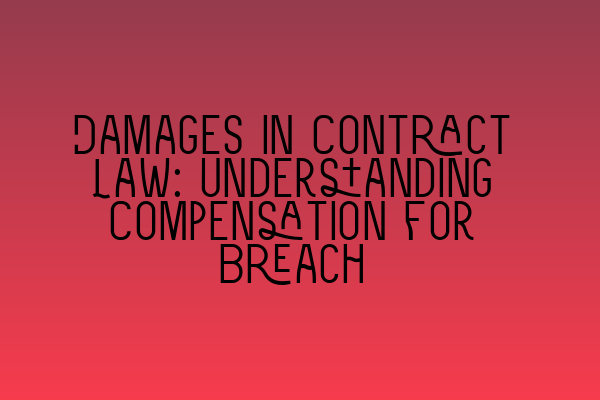Damages in Contract Law: Understanding Compensation for Breach
In the realm of contract law, damages play a crucial role in providing compensation to parties who have suffered harm due to a breach of contract. Whether you are a solicitor, a law student, or someone with a keen interest in contract law, it is essential to have a comprehensive understanding of this topic. In this blog post, we will delve into the concept of damages in contract law, explore the different types of damages available, and discuss their calculation and awarding process.
To provide some context, let’s imagine a scenario where Company A contracts with Company B to deliver a consignment of goods within a specified timeframe. However, Company B fails to fulfill its obligations and causes a loss to Company A. In such cases, damages can be claimed by Company A to compensate for its losses resulting from the breach of contract.
Types of Damages:
1. Compensatory Damages:
Compensatory damages aim to put the innocent party in the position they would have been in if the breach had not occurred. This type of damage encompasses both direct and indirect losses, such as financial losses, loss of profits, and consequential damages. Calculating compensatory damages requires a meticulous assessment of the actual harm suffered.
2. Nominal Damages:
Nominal damages are awarded when a breach of contract has occurred, but the innocent party has not suffered any significant loss. This symbolic compensation allows the party to enforce their rights and seek legal recourse for the breach.
3. Liquidated Damages:
Liquidated damages come into play when parties agree in advance on a specific amount to be payable in case of a breach. These damages are pre-determined and serve as a reasonable estimate of the potential loss that may arise from the breach. However, it is vital to note that the enforceability of liquidated damages clauses can be subject to scrutiny by the courts.
4. Punitive Damages:
Unlike compensatory damages, which aim to compensate for the actual loss suffered, punitive damages have a deterrent effect. They are awarded in exceptional circumstances where the breaching party’s behavior is deemed particularly reprehensible or malicious. Notably, in the UK, punitive damages are generally not awarded in contract law cases, as the focus is primarily on compensation rather than punishment.
Calculating Damages:
When it comes to calculating damages, several factors come into play. The court considers the remedies available to the innocent party and ensures that the damages awarded are fair, just, and reasonable. The calculation process involves a detailed examination of the financial statements, evidence of loss, and expert opinions, if necessary. The goal is to assess the actual loss suffered and provide adequate compensation to the affected party.
Awarding Damages:
The court’s ultimate aim in awarding damages is to restore the innocent party to the position they would have been in had the breach not occurred. However, it is crucial to remember that damages are not intended to provide a windfall. The court seeks to strike a balance between compensating the innocent party and preventing unjust enrichment.
Conclusion:
Understanding damages in contract law is paramount for solicitors, law students, and anyone interested in contract law. By comprehending the different types of damages available, the calculation process, and the overarching goal of compensation, one can navigate breach of contract cases with confidence. Damages serve as a tool to restore parties to their rightful position and provide justice in the face of a breached agreement.
For further insights into legal practice and decision-making, check out our article on “Unveiling Real-Life Case Studies: Insights into Legal Practice and Decision-Making.” For information about solicitor salaries in the UK and the factors affecting income, explore our article on “Exploring Solicitor Salaries in the UK: Average Earnings and Factors Affecting Income.” Additionally, if you’re interested in enhancing client relationship management skills as a solicitor, our article on “Mastering Client Relationship Management: Skills for Solicitors to Enhance Trust and Loyalty” will be a valuable resource. And if you’re considering a law school education in the UK, our article on “Pursuing a Law School Education in the UK: Choosing the Right Path for Your Future” provides valuable insights. Lastly, if you’re on the journey to becoming a solicitor and securing training contracts, our article on “Securing Training Contracts: A Roadmap to Becoming a Solicitor” is a must-read.
